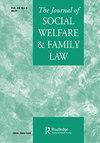Children – the hidden or direct victims of domestic abuse?
IF 0.6
Q2 LAW
引用次数: 0
Abstract
ABSTRACT As the psychological impact of childhood exposure to domestic abuse gains more traction, referring to children as ‘the hidden victims of domestic abuse’ is becoming increasingly inaccurate and reductionist. Representing children as mere witnesses of domestic abuse also poses wider implications from the view of law and policy. Jurisdictions which recognise children as direct victims rather than hidden witnesses of domestic abuse, for example, send a clear message that the psychological harm of experiencing domestic abuse merits robust intervention (e.g. additional funding for child-specific support and services). Using a comparative approach, this study analyses the legal recognition of children who experience domestic abuse for the purposes of exploring how the child should be conceptualised in laws regulating childhood exposure to domestic abuse. For this comparative review, the jurisdictions of England and Wales, New Zealand and the United States (specifically the State of Washington) were selected, on the basis that they all respond to child experiences of domestic abuse in distinct ways that raise pertinent points of contrast. Whilst the State of Washington relies primarily on perpetrator-centric, criminal law responses to child experiences of domestic abuse, England and Wales and New Zealand resort to family law mechanisms that focus more on the child and the parent–child relationship. All in all, these points of contrast are pertinent because they provide an exploratory view of how the child should be conceptualised in law and policy. As this paper submits, conceptualising the child as a direct victim of domestic abuse––as reflected in England and Wales and New Zealand’s legislative efforts––works to send a powerful message about the severity of harm that children suffer when they experience domestic abuse. The State of Washington, on the other hand, has much to learn from England and Wales and New Zealand’s conceptualisation of the child, as its current legislative efforts appear to be rooted in an outdated understanding of the child as a mere collateral witness.儿童——家庭虐待的隐藏或直接受害者?
摘要随着儿童遭受家庭虐待的心理影响越来越大,将儿童称为“家庭虐待的隐藏受害者”越来越不准确,也越来越简化。从法律和政策的角度来看,将儿童仅仅作为家庭虐待的证人也会产生更广泛的影响。例如,承认儿童是家庭虐待的直接受害者而不是隐藏的证人的司法管辖区发出了一个明确的信息,即经历家庭虐待的心理伤害需要强有力的干预(例如,为针对儿童的支持和服务提供额外资金)。本研究采用比较方法,分析了对遭受家庭虐待的儿童的法律承认,目的是探讨如何在规范儿童遭受家庭虐待行为的法律中对儿童进行概念化。在这项比较审查中,选择了英格兰和威尔士、新西兰和美国(特别是华盛顿州)的司法管辖区,因为它们都以不同的方式应对儿童遭受家庭虐待的经历,并提出了相关的对比点。虽然华盛顿州主要依靠以行为人为中心的刑法来应对儿童遭受家庭虐待的经历,但英格兰、威尔士和新西兰则求助于更关注儿童和亲子关系的家庭法机制。总之,这些对比点是相关的,因为它们提供了一个探索性的观点,即在法律和政策中应该如何对儿童进行概念化。正如本文所述,将儿童概念化为家庭虐待的直接受害者——正如英格兰、威尔士和新西兰的立法努力所反映的那样——可以发出一个强有力的信息,即儿童在遭受家庭虐待时所遭受的伤害的严重性。另一方面,华盛顿州可以从英格兰、威尔士和新西兰对儿童的概念化中学到很多东西,因为其目前的立法努力似乎植根于对儿童仅作为附带证人的过时理解。
本文章由计算机程序翻译,如有差异,请以英文原文为准。
求助全文
约1分钟内获得全文
求助全文
来源期刊
CiteScore
2.00
自引率
13.30%
发文量
52
期刊介绍:
The Journal of Social Welfare & Family Law is concerned with social and family law and policy in a UK, European and international context. The policy of the Editors and of the Editorial Board is to provide an interdisciplinary forum to which academics and professionals working in the social welfare and related fields may turn for guidance, comment and informed debate. Features: •Articles •Cases •European Section •Current Development •Ombudsman"s Section •Book Reviews

 求助内容:
求助内容: 应助结果提醒方式:
应助结果提醒方式:


